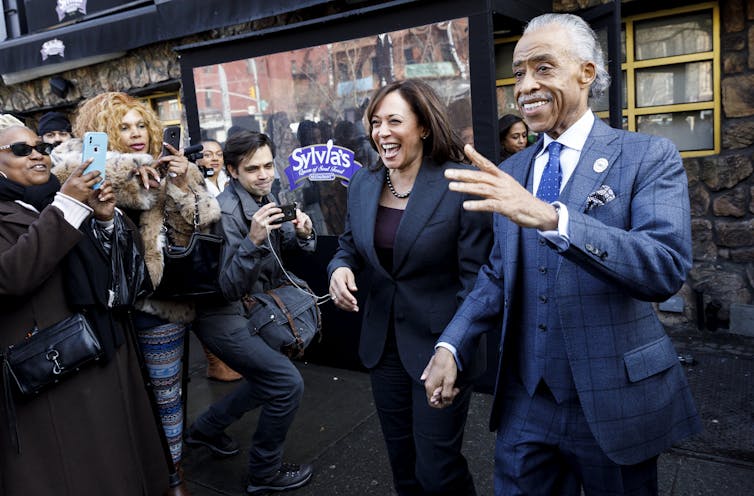Sanders, Harris, Biden... can anyone beat Donald Trump to become the next US president?
- Written by Dennis Altman, Professorial Fellow in Human Security, La Trobe University
No sooner had the US midterm elections for Congress concluded than jockeying began for the presidential elections in 2020. Barring either impeachment, which seems unlikely, or a health crisis, Donald Trump will seek re-election.
Although the last sitting president not to be re-elected was George Bush Sr in 1992, polls suggest Trump is consistently disliked by a majority of Americans.
Democrats see a remarkable opportunity to regain the White House.
It’s all about the Electoral College
In last November’s elections for the House of Representatives, Democrats out-polled the Republicans nationally by millions of votes. But because each state has two senators, a third of whom are elected every two years, this did not translate into control of the Senate – probably the most powerful upper house in the world.
 Democrats are hoping for continued success in the 2020 election.
David Maung/AAP
Democrats are hoping for continued success in the 2020 election.
David Maung/AAP
That imbalance is reflected in the presidential system, in which each state has votes in the Electoral College equivalent to their total representation in Congress.
Because votes are tallied by states, Hillary Clinton out-polled Trump by three million votes, but did not win the Electoral College. Her majority was too concentrated in large states like California and New York.
Read more: Trump will likely win reelection in 2020
A crowded field of Democrats
The lure of the presidency can attract otherwise rational people to illusions of grandeur. Rolling Stone lists 24 declared or potential candidates.
Among those who have declared themselves as candidates for the Democratic nomination are Tulsi Gabbard, member of the House of Representatives from Hawaii, and the Mayor of South Bend, Indiana, Pete Buttigieg.
According to the polls the two frontrunners are both men well into their seventies: Bernie Sanders, who came close to winning the nomination in 2016, and former Vice President Joe Biden. Other frontrunners include three women senators: most notably, Kamala Harris, who is from California – the largest state and a Democrat stronghold.
There are other candidates with home state advantages: Amy Klobuchar (Minnesota), Elizabeth Warren (Massachusetts) and Beto O’Rourke (Texas). None are as well-known as Sanders or Biden, which presumably explains their current lead in opinion polls. Despite Clinton’s defeat, I suspect at least one woman will be in a winnable position by March.
 Democratic Senator Kamala Harris of California, pictured with Reverend Al Sharpton, has announced her candidacy for president of the United States.
Justin Lane/EPA
Democratic Senator Kamala Harris of California, pictured with Reverend Al Sharpton, has announced her candidacy for president of the United States.
Justin Lane/EPA
Read more: The US midterms show the power of Trump's divisive messages
The primaries
California matters in the primaries because the nominee is chosen in a series of primary elections and caucuses, beginning in February. Primary elections are open to anyone who declares themselves Democrat when registering to vote. The process can be bizarre, and it varies from state to state, but it allows far greater participation than anything in Australia’s much more regulated system.
Cruelly, the first two decisions come in deep winter in Iowa and New Hampshire, essentially winnowing out the also-rans. But the crucial date will be March 3 2020, with primaries in Alabama, California, Massachusetts, Minnesota, North Carolina, Oklahoma, Tennessee, Texas, Vermont, and Virginia.
By then enough votes will likely be decided to narrow the field to two or three, who may battle out the nomination until the Democratic Convention in Milwaukee in July. The choice of Wisconsin reflects the reality that, along with Michigan and Ohio, it is one of the mid-west states that voted for Obama and was then narrowly won by Trump in 2016.
A shift to the left
The centre of gravity in the Democratic Party has moved to the left since Clinton beat Sanders for the nomination. Other than Biden, the leading candidates have embraced many of the positions Sanders took last time.
The dilemma for them is that what appeals to voters in party primaries may make them vulnerable to attacks from the right in a presidential election. This could make it hard for them to win the states regarded as crucial by both sides, such as Pennsylvania and Florida.
Trump will go into the 2020 election with money, enthusiasm and apparently unchallenged support from most Republicans, including some who declared him unfit to serve two years ago. The sheer number of potential Democrats may mean the party will find it easier to unite than it did last time, when some of Sanders’ most enthusiastic supporters seemed to loathe Clinton more than Trump.
Much commentary suggests Democrats must choose between rallying their base – which means African-Americans, college-educated women and the young – versus a more direct pitch to working class voters in declining industries. But this is a false dichotomy: large numbers of Americans are disadvantaged by both economic and social structures.
Read more: Latinos can be an electoral force in 2020
Obama showed it was possible to build an alliance of minorities and white union members, of affluent liberals and struggling workers. Defeating Trump demands a candidate who both promises to restore political civility and is not cowed by Trump’s narcissist exhibitionism.
Voting in the United States is not compulsory, and Republican dominated legislatures have made it difficult for people of colour and the poor. Cynicism about the political process is understandably considerable. Trump will be defeated if the Democrats nominate a candidate able to persuade enough people who regard politics as irrelevant to their lives to make the effort to turn out.
Authors: Dennis Altman, Professorial Fellow in Human Security, La Trobe University




